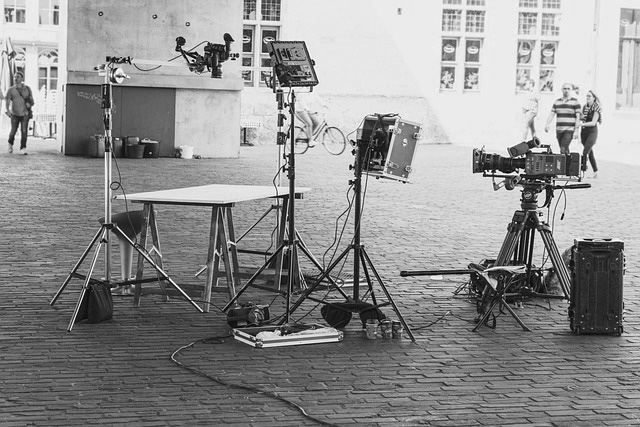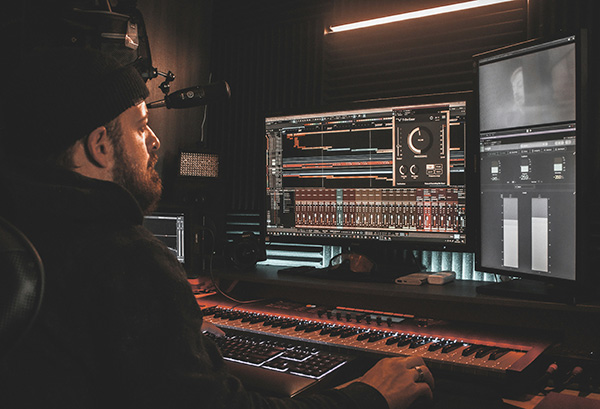A multimedia audio engineer is responsible for recording, mixing, and mastering sound to create immersive audio experiences in multimedia projects.
Types of Audio for Multimedia
History of Audio for Multimedia
Famous Multimedia Audio Engineers
Multimedia Audio Tips & Techniques
Types of Audio for Multimedia
Movie Soundtracks
This involves working on the audio elements of films, including recording dialogue, sound effects, and music. It encompasses roles such as sound design, dialogue editing, Foley artists, and re-recording mixers.
Music for Advertising
This involves creating music specifically for advertising purposes, such as commercials, online ads, and promotional videos. It includes composing, producing, and arranging music that aligns with the brand’s message and enhances the impact of the advertisement.
Re-recording Mixer
Re-recording mixers are responsible for mixing audio tracks for feature films or television programs during post-production.
Podcast Editing
Podcast editing involves the post-production process of refining and enhancing audio recordings for podcasts. It includes tasks such as editing, cleaning up audio, adding music, and ensuring a smooth and professional sound for the final product.
Sound Branding
Sound branding focuses on creating distinctive audio elements that represent a brand or company. It includes creating jingles, audio logos, and sonic identities that reinforce brand recognition and create a unique auditory experience for consumers.
Game Sound Design
Game sound design involves creating and implementing audio elements for video games. This includes designing sound effects, ambient sounds, music, and interactive audio systems to enhance the gaming experience.
Voiceover Recording
Voiceover recording focuses on capturing high-quality voice recordings for various purposes, such as commercials, animations, documentaries, and video games. It involves working with voice actors, setting up recording sessions, and ensuring clear and crisp voice recordings.
History of Multimedia Audio
The history of audio engineering for multimedia is closely intertwined with the development of multimedia technologies and the evolution of audio recording and production techniques. Over time, audio engineering has played a pivotal role in enhancing various forms of multimedia content. Let’s explore its journey and upcoming trends:
Emergence of Multimedia
The term “multimedia” was coined in 1962, referring to the integration of multiple media forms into a single presentation or experience. As multimedia technologies advanced, audio became an indispensable component of multimedia productions.
Advancements in Sound Recording
The development of sound recording technologies has significantly influenced audio engineering for multimedia. The introduction of electrical recording in the 1920s improved the fidelity and quality of recorded sound, enabling audio engineers to capture richer and more detailed audio for multimedia applications.
Integration of Audio in Multimedia
With the rise of multimedia computing in the 1990s, audio became an integral part of multimedia presentations. Text, images, animations, video, and audio were combined to create interactive and captivating experiences for users.
Digital Audio Revolution
The advent of digital audio revolutionized the field of audio engineering for multimedia. Digital audio formats, such as WAV and MP3, allowed for easy storage, manipulation, and sharing of audio content. This opened up new possibilities for multimedia applications and enhanced the overall audio quality.
Role in Games, Movies, Commercials, and Sound Branding
Audio engineering for multimedia expanded its reach to various domains. In the world of games, audio engineers create immersive soundscapes, realistic sound effects, and dynamic soundtracks that enhance gameplay and player engagement. In movies and commercials, audio engineers play a vital role in crafting impactful soundtracks, designing sound effects, and ensuring high-quality audio for an immersive cinematic experience. Additionally, sound branding has gained prominence, with audio engineers helping to develop recognizable sonic identities for brands, enhancing brand recall and emotional connection with consumers.
Upcoming Trends
The future of audio engineering for multimedia holds exciting possibilities. In games, advancements in virtual reality (VR) and augmented reality (AR) technologies will create even more immersive audio experiences. Movies will continue to embrace innovative sound formats, such as Dolby Atmos, for a more realistic and enveloping audio experience. Commercials will explore new ways to captivate audiences through creative and memorable audio branding. Sound branding will evolve further, leveraging neuroscience and psychology to create audio experiences that resonate deeply with consumers.
The history and future of audio engineering for multimedia are intertwined with technological advancements and the ever-changing landscape of multimedia applications. As technology progresses, audio engineers will continue to push boundaries and create captivating audio experiences for games, movies, commercials, and sound branding.

Essential Tools for Multimedia Audio (Games / AV)
Digital Audio Workstations (DAWs)
DAWs are comprehensive software platforms used for recording, editing, and mixing audio. They provide a wide range of features and capabilities for composing music, creating sound effects, and designing audio for games, movies, and commercials. Popular DAWs in the industry include Pro Tools, Logic Pro, Ableton Live, and Cubase.
Virtual Instruments and Sample Libraries
Virtual instruments are software-based synthesizers, samplers, and emulations of real instruments. They allow composers and sound designers to create realistic and expressive musical compositions and soundscapes. Sample libraries provide a vast collection of pre-recorded sounds and samples that can be used to enhance music and sound design.
Middleware
Middleware refers to software tools specifically designed for integrating audio into games and interactive media. These tools provide functionalities such as interactive music systems, dynamic sound effects, and spatial audio. Some commonly used middleware solutions in the game industry include FMOD and Wwise. These tools enable game developers and sound designers to create immersive audio experiences that respond to the player’s actions and the game’s events.


Famous Audio Engineers in Multimedia
Here’s a glimpse into the world of some famous audio engineers, game sound designers, and movie soundtrack composers who have made significant contributions to the multimedia industry:
George Lucas
Although primarily known as the creator of the Star Wars franchise, George Lucas played a crucial role in revolutionizing sound design in film. With the release of “Star Wars: Episode IV – A New Hope” in 1977, Lucas introduced groundbreaking sound effects and immersive audio techniques that set new standards for the industry.
Hans Zimmer
A prolific composer, Hans Zimmer has composed music for numerous blockbuster movies, including “The Lion King,” “Inception,” and “The Dark Knight Trilogy.” His unique approach to film scoring, blending traditional orchestral elements with electronic and experimental sounds, has garnered him critical acclaim and multiple awards.
Randy Thom
As a renowned sound designer and audio engineer, Randy Thom has played an integral role in shaping the soundscapes of many iconic films, including “The Incredibles,” “Forrest Gump,” and “The Right Stuff.” His innovative techniques and attention to detail have earned him multiple Academy Awards for Sound Design.
Koji Kondo
Known as one of the pioneers of video game music, Koji Kondo is responsible for composing the iconic soundtracks of Nintendo’s Super Mario and The Legend of Zelda series. His memorable melodies and innovative use of technology have left an indelible mark on the gaming industry.
Laura Karpman
Laura Karpman is an accomplished composer and sound designer, renowned for her work in film, television, and video games. She has composed music for projects such as “Set It Off,” “Underground,” and the video game “EverQuest II.” Karpman is also known for her advocacy for diversity and inclusivity in the industry.
Three Multimedia Audio Tips & Techniques
Understand the Building Blocks of Audio
Familiarize yourself with the fundamental elements of audio in multimedia. These typically include interview clips, voice-overs, natural sound, and ambient sound. Knowing how to effectively utilize these building blocks is crucial for creating high-quality audio experiences
Pay Attention to Signal-to-Noise Ratio
Maintaining a good signal-to-noise ratio is essential for clear and immersive audio. Ensure that the desired audio elements are prominent and free from unwanted background noise. Techniques such as using directional microphones or noise reduction tools can help achieve a better signal-to-noise ratio.
Reference Your Mixes on Different Playback Systems
To ensure that your audio translates well across various devices and environments, it’s important to reference your mixes on different playback systems. This includes listening on studio monitors, headphones, earbuds, and even in different physical locations. This practice helps you identify any issues or imbalances in the audio and make necessary adjustments for optimal playback quality.
Why Hire a Professional Audio Engineer for Your Multimedia Project?
Hiring a professional audio expert for your multimedia project, whether it’s a game, movie, commercial, or sound branding, can bring numerous benefits. Here are a few reasons why it’s advantageous to work with a professional:
Expertise and Experience
Professional audio experts have specialized knowledge and extensive experience in their field. They understand the intricacies of audio production, sound design, mixing, and mastering. Their expertise allows them to deliver high-quality audio that meets industry standards and elevates the overall production value of your project.
Attention to Detail and Artistic Vision
Audio experts have a keen ear for detail and a strong artistic vision. They can analyze the specific requirements of your project and translate your creative vision into captivating audio. They pay attention to nuances such as sound effects, music composition, voice-over recordings, and overall soundscapes to enhance the emotional impact and storytelling of your multimedia project.
Collaboration and Creative Input
Working with a professional audio expert fosters collaboration and allows for creative input. They can provide valuable insights, suggest innovative ideas, and contribute to the overall artistic direction of your project. Their expertise can help you achieve the desired audio aesthetic and create a unique and memorable experience for your audience.
Access to Professional Tools and Equipment
Audio professionals have access to a wide range of professional-grade tools, software, and equipment specifically designed for audio production. They know how to utilize these resources effectively to achieve the desired sound and create immersive audio experiences.
Efficiency and Time-Saving
Hiring a professional audio expert can save you time and effort. They are well-versed in efficient workflows and can streamline the audio production process, ensuring timely delivery without compromising on quality. Their experience allows them to troubleshoot issues quickly and make informed decisions to meet project deadlines.